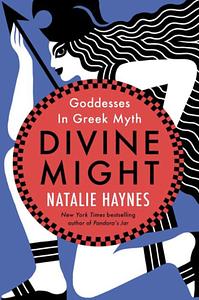Take a photo of a barcode or cover
dark
emotional
informative
medium-paced
funny
informative
lighthearted
reflective
fast-paced
funny
informative
medium-paced
How this book ended up on my TBR: First off, I'm a sucker for anything Greek mythology. I learned about Haynes through a Miss Marple short story she wrote, of all things. I read and loved A Thousand Ships. Most immediately, I used this book to complete The StoryGraph's Genre Challenge 2025, Prompt 1: Nonfiction about visual art or an artist. This is a bit of a stretch, as the book is not primarily about visual art (though to be fair, I did not add the book to this prompt). Haynes does talk about statues, buildings, paintings, and other visual art that she has either studied in person or through research.
I am now committed to reading anything Natalie Haynes writes, especially as it pertains to Greek mythology and history.
For all of her love of Greek mythology and culture, Haynes has a bone to pick: the representation of women in general, and goddesses specifically in this book, is limited at best. Why? Because the representations were created by high society men. Early on in this book, Haynes wonders aloud: how would things be different if women created Greek mythology? She can't entirely answer this question, but she does offer a fascinating perspective that includes some historical context. In this collection, Haynes focuses on the major goddesses (Hera, Aphrodite, Artemis, Demeter, Hestia, and Athene), as well as minor goddesses and beings (the Muses and the Furies). If you're looking for a basic history lesson on the goddesses, you won't find it here. Each chapter includes description of long-lost or still existing artistic representations of the subjects. She also shares stories and descriptions from epic poetry. Demeter's chapter heavily and necessarily includes Persephone, whereas Athene's chapter focuses quite a bit on The Iliad. In many chapters, Haynes includes some more current adaptations of Greek mythology. I was tickled to read about the Percy Jackson series, and I would love to know her thoughts on the Lore Olympus webcomic (she is absolutely not a fan of Hades).
I like that Haynes includes Hestia, who is probably the least controversial of all the gods and goddesses, though she is one of the first and thus most powerful. Though Haynes can't find a lot of writing or art about Hestia, she nonetheless finds it important to write about the goddess of the hearth, the most important of all structures in Ancient Greece.
Of all the chapters, I was probably most impressed by the one on Hera. Hera is not Haynes's favorite (that honor goes to Athene, probably for being a badass), but Haynes makes the argument that Hera has been dealt a rough hand and has probably the worst reputation of all the gods and goddesses. She comes across as cruel, spiteful, just awful. But how would you feel as the wife of Zeus, the most powerful god who also happens to bed practically anything that moves? I never even knew that Zeus had wives prior to Hera, which of course opens the possibility of Hera losing her place as well. So Haynes doesn't absolve Hera, but she provides some context. It's not like the other goddesses (especially Artemis and Athene) are any less petty.
I appreciated that each chapter was different and, instead of following the same pattern for each character, she focused on specific historical references and provided context for the representations. And she doesn't always go the route I expected. The more I think about this book, the more I sort of want to own it for my own (and the cover is pretty amazing).
This book is my first nonfiction read for Haynes, and I found her writing style to be incredibly easy to read. She included some funny asides, and I enjoyed her concise descriptions of the art she'd seen. I also really like that she delved into the literature; she seems incredibly knowledgeable of the historical references and the classics themselves, going so far as to include the original Greek and translations of terms.
I am now committed to reading anything Natalie Haynes writes, especially as it pertains to Greek mythology and history.
For all of her love of Greek mythology and culture, Haynes has a bone to pick: the representation of women in general, and goddesses specifically in this book, is limited at best. Why? Because the representations were created by high society men. Early on in this book, Haynes wonders aloud: how would things be different if women created Greek mythology? She can't entirely answer this question, but she does offer a fascinating perspective that includes some historical context. In this collection, Haynes focuses on the major goddesses (Hera, Aphrodite, Artemis, Demeter, Hestia, and Athene), as well as minor goddesses and beings (the Muses and the Furies). If you're looking for a basic history lesson on the goddesses, you won't find it here. Each chapter includes description of long-lost or still existing artistic representations of the subjects. She also shares stories and descriptions from epic poetry. Demeter's chapter heavily and necessarily includes Persephone, whereas Athene's chapter focuses quite a bit on The Iliad. In many chapters, Haynes includes some more current adaptations of Greek mythology. I was tickled to read about the Percy Jackson series, and I would love to know her thoughts on the Lore Olympus webcomic (she is absolutely not a fan of Hades).
I like that Haynes includes Hestia, who is probably the least controversial of all the gods and goddesses, though she is one of the first and thus most powerful. Though Haynes can't find a lot of writing or art about Hestia, she nonetheless finds it important to write about the goddess of the hearth, the most important of all structures in Ancient Greece.
Of all the chapters, I was probably most impressed by the one on Hera. Hera is not Haynes's favorite (that honor goes to Athene, probably for being a badass), but Haynes makes the argument that Hera has been dealt a rough hand and has probably the worst reputation of all the gods and goddesses. She comes across as cruel, spiteful, just awful. But how would you feel as the wife of Zeus, the most powerful god who also happens to bed practically anything that moves? I never even knew that Zeus had wives prior to Hera, which of course opens the possibility of Hera losing her place as well. So Haynes doesn't absolve Hera, but she provides some context. It's not like the other goddesses (especially Artemis and Athene) are any less petty.
I appreciated that each chapter was different and, instead of following the same pattern for each character, she focused on specific historical references and provided context for the representations. And she doesn't always go the route I expected. The more I think about this book, the more I sort of want to own it for my own (and the cover is pretty amazing).
This book is my first nonfiction read for Haynes, and I found her writing style to be incredibly easy to read. She included some funny asides, and I enjoyed her concise descriptions of the art she'd seen. I also really like that she delved into the literature; she seems incredibly knowledgeable of the historical references and the classics themselves, going so far as to include the original Greek and translations of terms.
emotional
informative
inspiring
fast-paced
adventurous
informative
inspiring
medium-paced
informative
medium-paced
funny
informative
medium-paced
funny
informative
reflective
fast-paced
informative
reflective
medium-paced
informative
slow-paced





